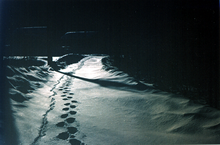All people are wounded, but people who come here can't cover
it up the way the rest do. Everybody has pain, everybody is
wounded. And because [Commonweal] participants can't cover up
their woundedness now that they have cancer, they can trust each
other. I can trust another person only if I can sense that they, too
have woundedness, have pain, have fear.
it up the way the rest do. Everybody has pain, everybody is
wounded. And because [Commonweal] participants can't cover up
their woundedness now that they have cancer, they can trust each
other. I can trust another person only if I can sense that they, too
have woundedness, have pain, have fear.
[When you have cancer, or other chronic or serious illness]
you feel separated from the whole human race. You feel
as though you're looking at the world through plate glass.
You can see other people, but you feel as if you can't touch them
or be with them, because you are different. They say that the
sense of isolation, of being separated from people who are
well, is as painful as chemotherapy, as cancer itself...
you feel separated from the whole human race. You feel
as though you're looking at the world through plate glass.
You can see other people, but you feel as if you can't touch them
or be with them, because you are different. They say that the
sense of isolation, of being separated from people who are
well, is as painful as chemotherapy, as cancer itself...
Years ago, when I was Associate Director of the pediatric
clinics at the Stanford Medical School, one of my
colleagues, Marshall Klaus, did a study which at the time
was extremely innovative. He was chief of the intensive
care nursery, where all the babies were these tiny little
people you could hold in your hand. Each incubator was
surrounded by shifts of people and millions of dollars worth
of equipment. Everything was high-tech. Of course, we
didn't touch these infants because we'd get germs on them.
But Klaus decided to do an experiment in which half the
babies in the nursery would be treated as usual, and the
other half would be touched for fifteen minutes every few
hours. You'd take your pinky finger and rub it up and down
the little baby's back. And we discovered that the babies
that were touched survived better. No one knows why.
Maybe there's something about touching that strengthens
the will to live. Maybe isolation weakens us.
clinics at the Stanford Medical School, one of my
colleagues, Marshall Klaus, did a study which at the time
was extremely innovative. He was chief of the intensive
care nursery, where all the babies were these tiny little
people you could hold in your hand. Each incubator was
surrounded by shifts of people and millions of dollars worth
of equipment. Everything was high-tech. Of course, we
didn't touch these infants because we'd get germs on them.
But Klaus decided to do an experiment in which half the
babies in the nursery would be treated as usual, and the
other half would be touched for fifteen minutes every few
hours. You'd take your pinky finger and rub it up and down
the little baby's back. And we discovered that the babies
that were touched survived better. No one knows why.
Maybe there's something about touching that strengthens
the will to live. Maybe isolation weakens us.
Rachel Naomi Remen
Cofounder of the Commonweal Cancer Help Program,
as interviewed by Bill Moyers in
Healing and the Mind
Cofounder of the Commonweal Cancer Help Program,
as interviewed by Bill Moyers in
Healing and the Mind
with thanks to Rod MacIver
at Heron Dance
Rod is a survivor of 4th stage Lymphoma.
at Heron Dance
Rod is a survivor of 4th stage Lymphoma.
~
Photo - Mystic Meandering
~
"People don't care how much you know,
until they know how much you care."
whatever happened to compassion...
until they know how much you care."
whatever happened to compassion...













No comments:
Post a Comment
All comments are subject to moderation